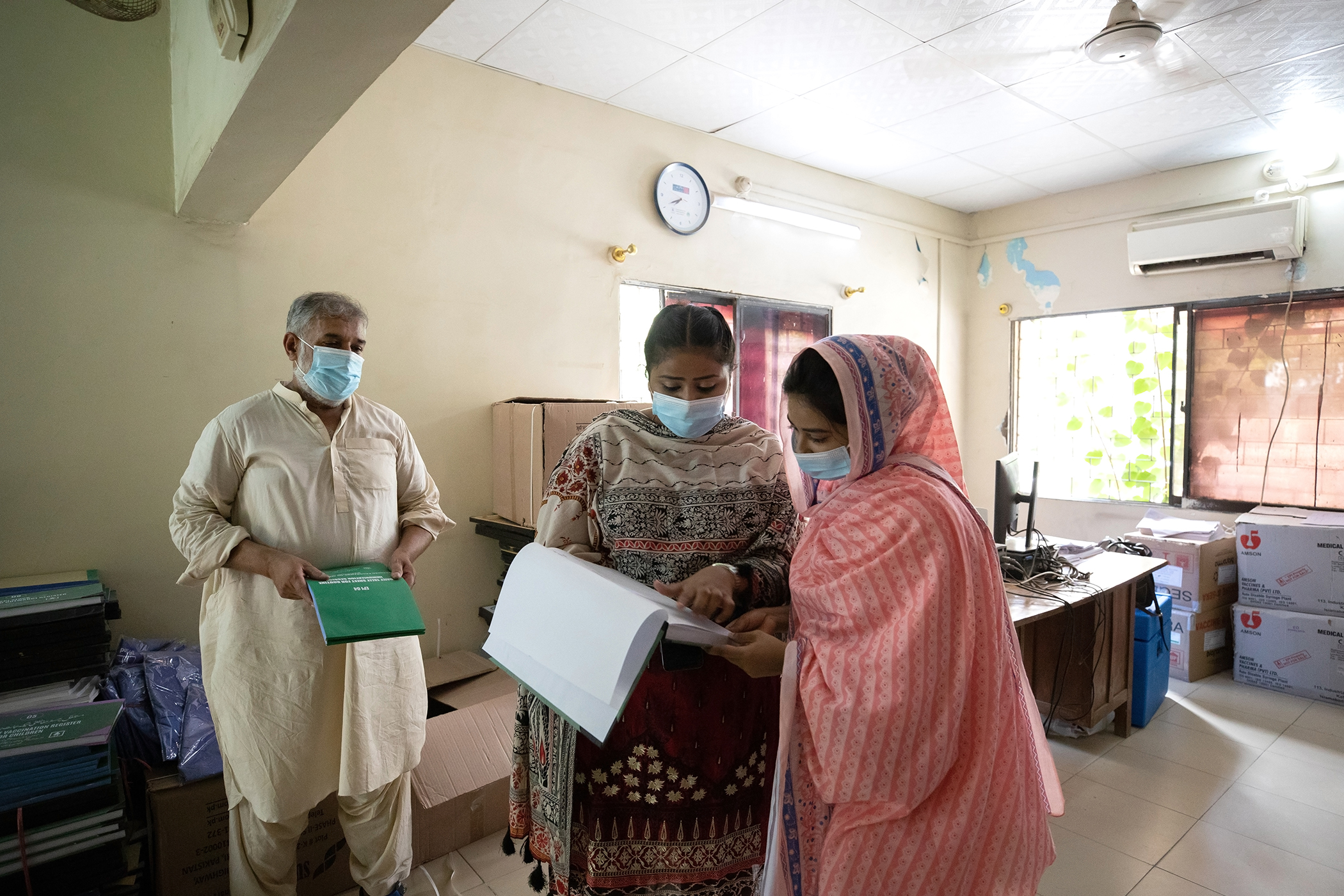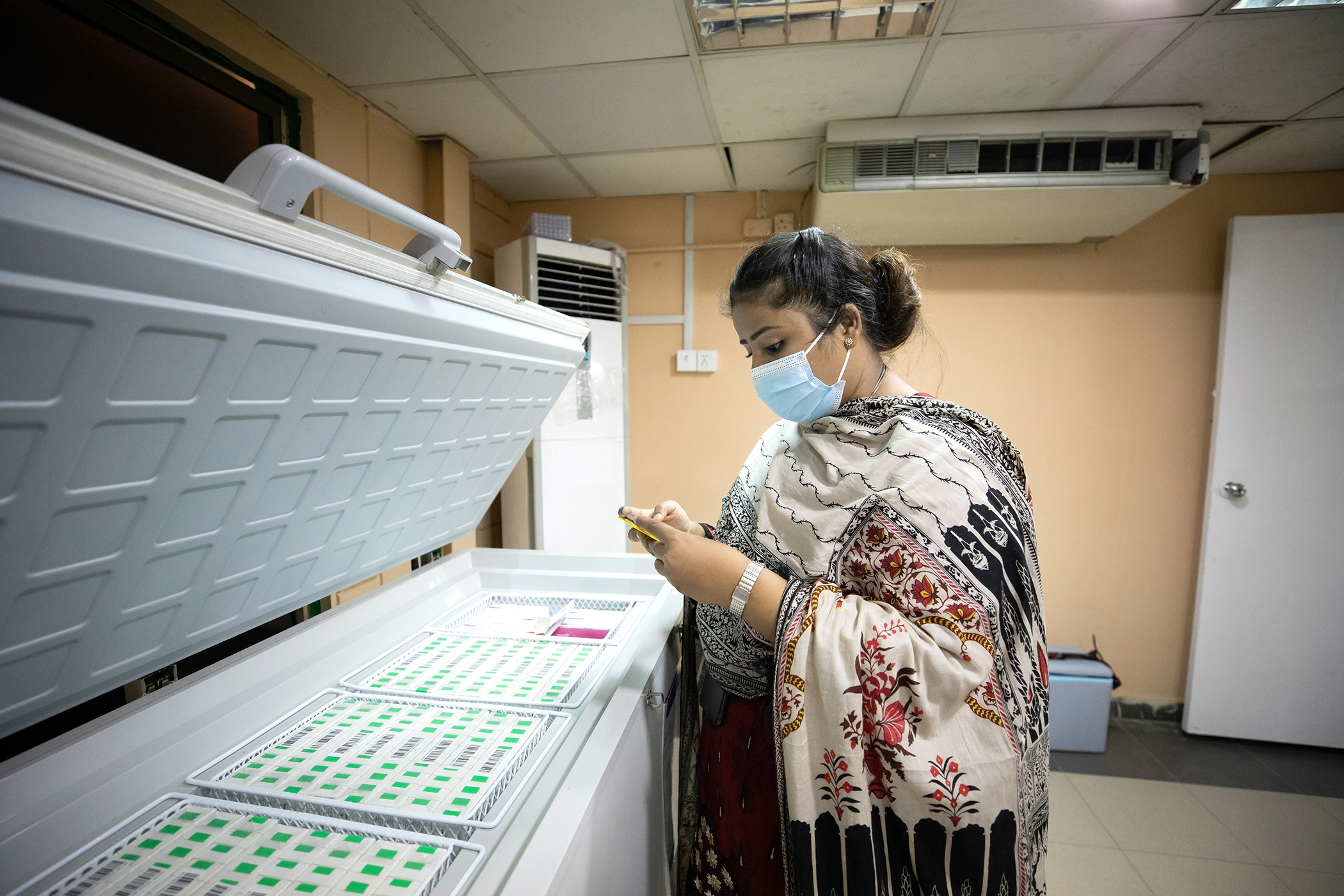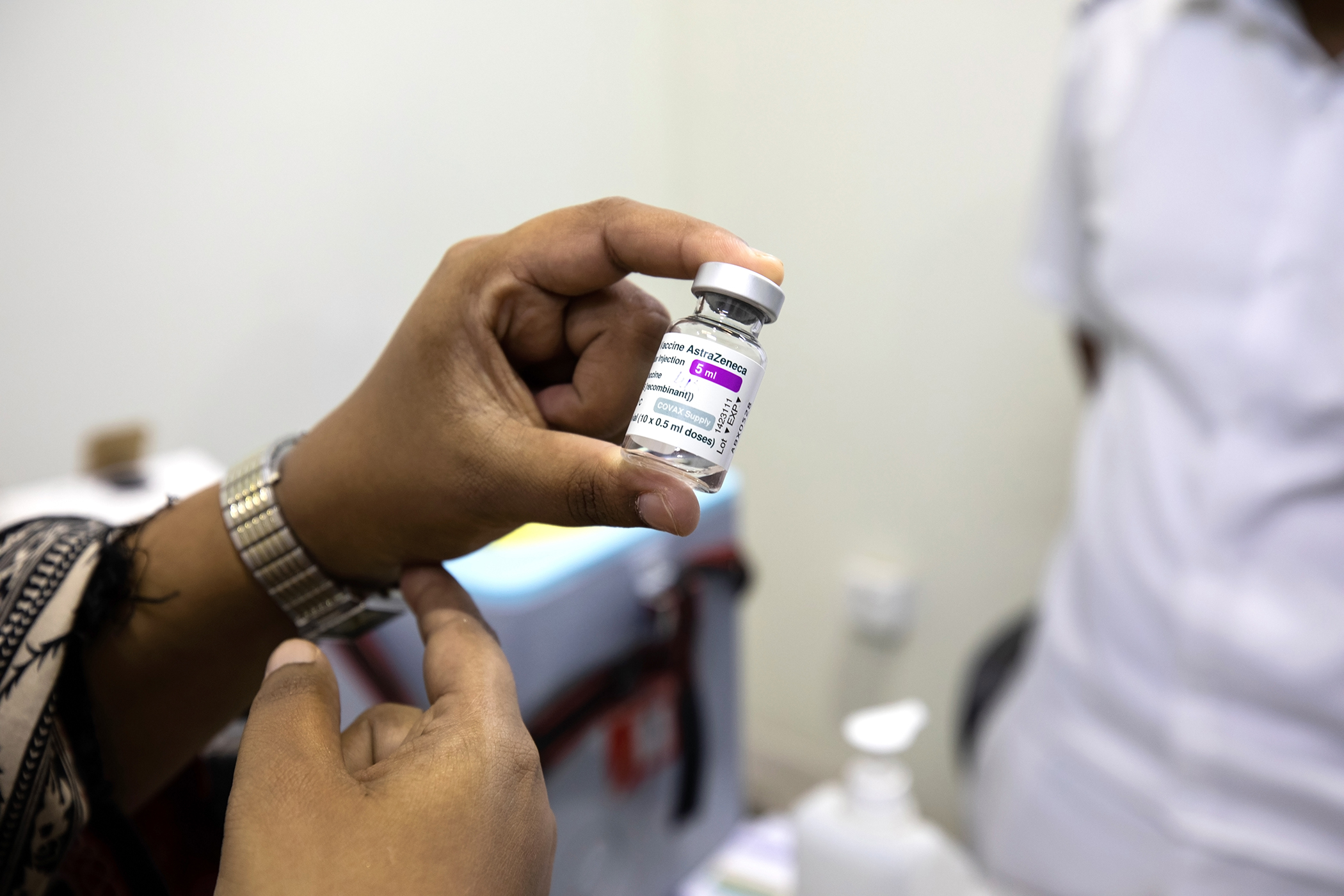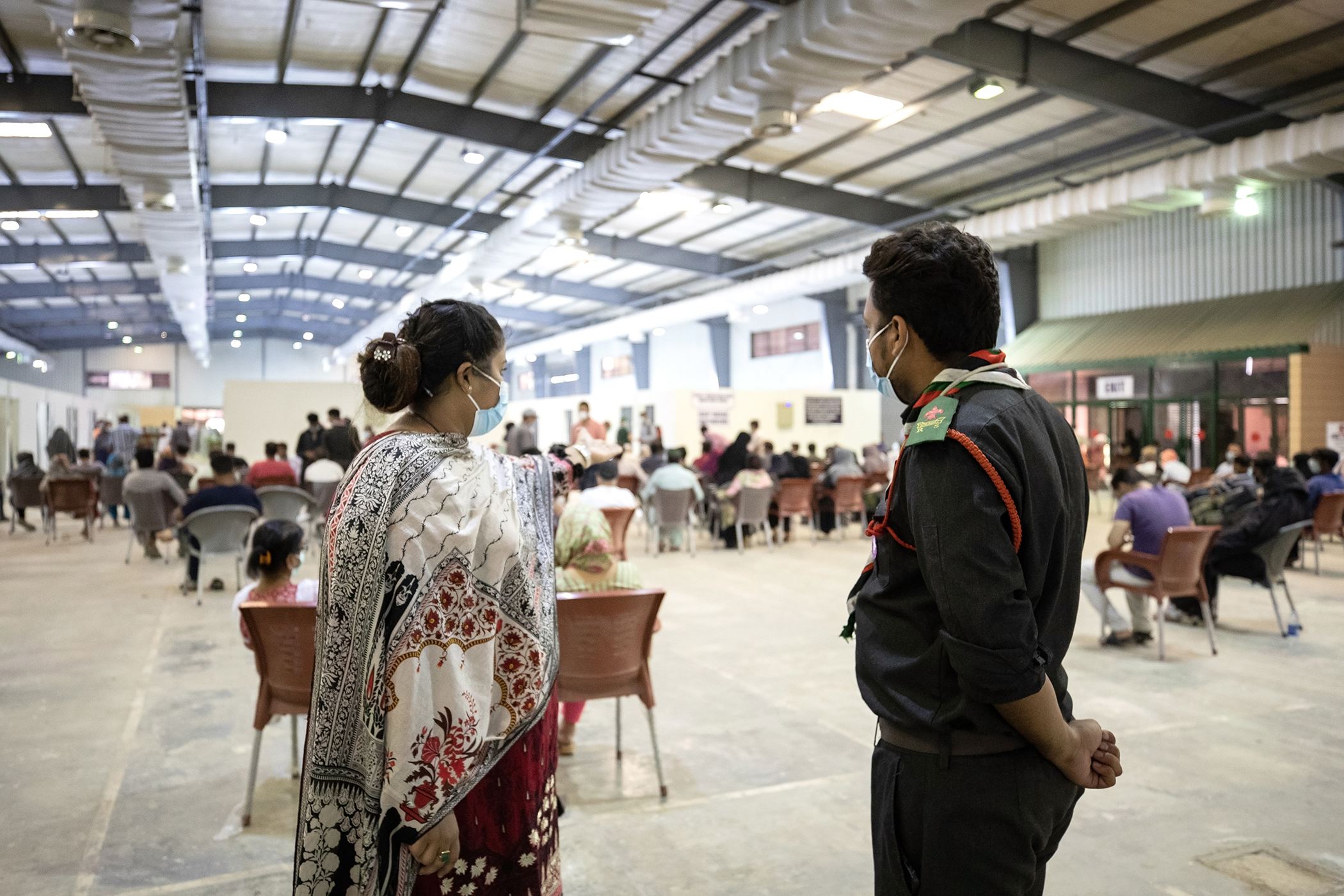Tahira Bano’s phone doesn't stop buzzing these days. The district superintendent of vaccination in Pakistan’s Karachi East District receives around 200 calls on any given day, as people reach out to inquire about COVID-19 vaccinations.
Bano, who previously worked on routine immunizations in the district, now focuses her attention on managing the coronavirus situation in the province.
Since her mobile number is listed on the ministry of health’s website as the primary contact in Karachi East, she is often people’s main point of contact when they want to ask about vaccine eligibility.
Responding to inquiries can be overwhelming, she said — especially since it’s not her primary responsibility, as she oversees vaccinations across the district, including a team of 173 vaccinators.
“I just want to help out everyone. I know this is not possible … but I really want to,” she told Global Citizen. “This is a very tough time for the people who are suffering from COVID-19.”
Since February 2020, when Pakistan detected its first positive COVID-19 case, Bano has worked around the clock to manage virus samples, coordinate lab results, oversee contract tracing, and update the government’s dashboard with data.
Bano also managed the logistics around obtaining and distributing personal protective equipment such as gowns, masks, and sanitizers for health centers across the district.
 Tahira Bano poses for a portrait in Karachi, Pakistan on June 5, 2021.
Tahira Bano poses for a portrait in Karachi, Pakistan on June 5, 2021.
Tahira Bano poses for a portrait in Karachi, Pakistan on June 5, 2021.
Since February 2021, when Karachi East began vaccinating people against COVID-19, Bano has been responsible for overseeing the process and supervising six vaccination centers, including one that operates 24/7, which she said is convenient.
“Some people are outside for [a late meal] very late at 2 a.m. or 3 a.m., and if they are outside, they say, ‘Lets have vaccination done.’ So they have the option to visit the 24/7 site,” she said.
During the day, she ensures vaccinations across the centers are all operating smoothly and according to protocol. In the evenings, she compiles data on the day’s vaccinations, sharing it with her supervisors.
Bano, who said she gets five hours of sleep per night at most, has been working seven days a week for over a year. She recalls spending holidays, such as Eid and the Independence Day of Pakistan, in her office.
“I don’t have any time for myself. I can’t go to the market. All the time I have is engaged in vaccination services,” she said.
But despite the long hours, her outlook remains positive.
“I don’t take it as a burden. When I go [to my job], I work with full commitment and dedication,” she said. “I just want my country to be on top … I want to change all these negative [perceptions of Pakistan] and I want to play my part.”
Pakistan, which is currently providing citizens with the Sinopharm and CanSino vaccines, first vaccinated the country’s health care workers, followed by people above 70 years of age. Currently, those above 50 years of age are eligible to be vaccinated. Mobile vaccinations are available for those who can’t reach centers themselves, and are in high demand, Bano said.
Bano, who has been fully vaccinated against COVID-19, was ecstatic when it was her turn.
“I obviously felt really happy that in our country we have such facilities to combat this pandemic,” she said, noting that vaccination is “the only way” to control the coronavirus.
Bano said getting vaccinated herself helped reassure people that the COVID-19 vaccine is safe.
“People were so scared about the vaccination,” she said. “I got my dose first, and then I guided my team: ‘Look, there is nothing [to be concerned about] — take your dose.’”
When Bano’s team of 173 vaccinators across the province received their vaccinations, she said it caused a ripple effect that resulted in more people at the community level trusting in the safety of the vaccine, and being willing to receive it themselves.
In Karachi East, on average, nearly 3,000 people are vaccinated per day.
In fact, Bano said the COVID-19 vaccines have been so well-received in Pakistan, that she has to reassure those who aren’t yet eligible to patiently wait their turn, saying that young people in particular have been calling her to ask if they can receive their shot.
Bano, who has been working as the district superintendent of vaccination in Karachi East since 2018, is the only woman to hold this role in the district, and said it comes with challenges.
 Tahira Bano, pictured at her office in Karachi, Pakistan on June 5, 2021, has been working as the district superintendent of vaccination in Karachi East since 2018 and is the only woman to hold this role in the district.
Tahira Bano, pictured at her office in Karachi, Pakistan on June 5, 2021, has been working as the district superintendent of vaccination in Karachi East since 2018 and is the only woman to hold this role in the district.
Tahira Bano, pictured at her office in Karachi, Pakistan on June 5, 2021, has been working as the district superintendent of vaccination in Karachi East since 2018 and is the only woman to hold this role in the district.
While working on routine immunizations, Bano travels by public transportation and often considers her safety when traveling to some areas in the district. In addition, she has faced verbal abuse from people who oppose vaccines.
“We have people who … easily lose their temper and start shouting,” she said, as they oppose their children receiving vaccines. “I face these issues when I am in buses, and in [vaccination] centers and when I am in the field. I have to listen to their shouting: ‘What are you doing? You are not good. You vaccinate our children.’”
In these instances, Bano says, she listens to them, and tries to explain the importance of vaccinations. At times, she’s successful — particularly when speaking with other women, who she said willingly open their homes to her to discuss vaccinating their children.
“Women trust me and I can brief them more than men. Many parents, many mothers, who [oppose vaccines for their children] get convinced,” she said.
Following the A-Team is a content series that profiles the women working on the ground to combat COVID-19 via the ACT-Accelerator.
Launched in April 2020 by seven global partners, the ACT-Accelerator is a unique coalition aimed at accelerating global efforts against the COVID-19 pandemic. Its members are working together to develop tests, treatments, and vaccines as quickly as possible, while also strengthening the world’s most fragile health systems.
The organization desperately needs financial support from governments around the world. You can join us in calling on world leaders to fund the ACT-Accelerator by taking action here.
Disclosure: This series was made possible with funding from the Bill and Melinda Gates Foundation. Each piece was produced with full editorial independence.



